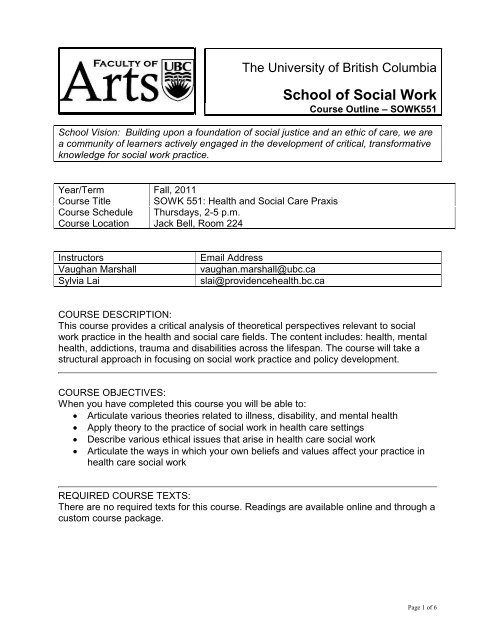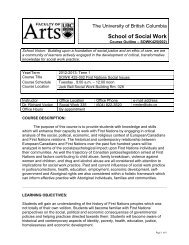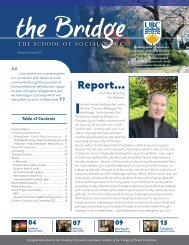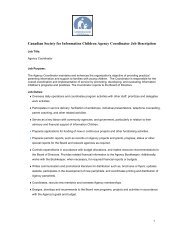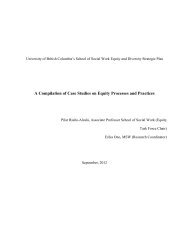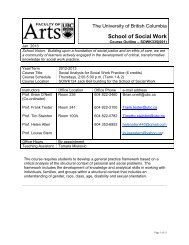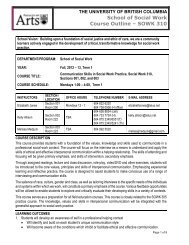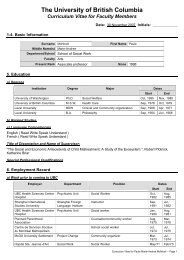SOWK 551.001. Health and Social Care Praxis. - School of Social ...
SOWK 551.001. Health and Social Care Praxis. - School of Social ...
SOWK 551.001. Health and Social Care Praxis. - School of Social ...
Create successful ePaper yourself
Turn your PDF publications into a flip-book with our unique Google optimized e-Paper software.
<strong>School</strong> Vision: Building upon a foundation <strong>of</strong> social justice <strong>and</strong> an ethic <strong>of</strong> care, we are<br />
a community <strong>of</strong> learners actively engaged in the development <strong>of</strong> critical, transformative<br />
knowledge for social work practice.<br />
Year/Term Fall, 2011<br />
Course Title <strong>SOWK</strong> 551: <strong>Health</strong> <strong>and</strong> <strong>Social</strong> <strong>Care</strong> <strong>Praxis</strong><br />
Course Schedule Thursdays, 2-5 p.m.<br />
Course Location Jack Bell, Room 224<br />
Instructors Email Address<br />
Vaughan Marshall vaughan.marshall@ubc.ca<br />
Sylvia Lai slai@providencehealth.bc.ca<br />
The University <strong>of</strong> British Columbia<br />
<strong>School</strong> <strong>of</strong> <strong>Social</strong> Work<br />
Course Outline – <strong>SOWK</strong>551<br />
COURSE DESCRIPTION:<br />
This course provides a critical analysis <strong>of</strong> theoretical perspectives relevant to social<br />
work practice in the health <strong>and</strong> social care fields. The content includes: health, mental<br />
health, addictions, trauma <strong>and</strong> disabilities across the lifespan. The course will take a<br />
structural approach in focusing on social work practice <strong>and</strong> policy development.<br />
COURSE OBJECTIVES:<br />
When you have completed this course you will be able to:<br />
Articulate various theories related to illness, disability, <strong>and</strong> mental health<br />
Apply theory to the practice <strong>of</strong> social work in health care settings<br />
Describe various ethical issues that arise in health care social work<br />
Articulate the ways in which your own beliefs <strong>and</strong> values affect your practice in<br />
health care social work<br />
REQUIRED COURSE TEXTS:<br />
There are no required texts for this course. Readings are available online <strong>and</strong> through a<br />
custom course package.<br />
Page 1 <strong>of</strong> 6
OUTLINE AND READINGS (Tentative):<br />
<strong>SOWK</strong>551 – 2011-2012 – V. Marshall <strong>and</strong> S. Lai<br />
Week 1: September 8 (Introduction to the course/ <strong>Social</strong> Determinants <strong>of</strong> <strong>Health</strong>)<br />
Reading:<br />
Ashcr<strong>of</strong>t, R. (2010). <strong>Health</strong> Inequities: Evolution <strong>of</strong> two paradigms. <strong>Health</strong> <strong>and</strong><br />
<strong>Social</strong> Work, 35(4), 249-256.<br />
Bolaria, B.S. (2002). Sociology, medicine, health, <strong>and</strong> illness. In B.S. Bolaria <strong>and</strong><br />
H.D. Dickenson (Eds.). <strong>Health</strong>, illness, <strong>and</strong> health care in Canada (3 rd<br />
ed.). (pp. 3-19). Scarborough ON: Nelson.<br />
Gregorian, C. (2005). A career in hospital social work: Do you have what it<br />
takes? <strong>Social</strong> Work in <strong>Health</strong> <strong>Care</strong>, 40(3), 1-14.<br />
Mikkonen, J., & Raphael, D. (2010). <strong>Social</strong> determinants <strong>of</strong> health; The Canadian<br />
facts. Available online at: http://www.thecanadianfacts.org/ (Click on<br />
“Download the Canadian facts).<br />
Week 2: September 15 (Trauma, Coping, Post-Traumatic Growth)<br />
Reading:<br />
Mundy, E., & Baum, A. (2004). Medical disorders as a cause <strong>of</strong> psychological<br />
trauma <strong>and</strong> post-traumatic stress disorder. Current Opinion in Psychiatry,<br />
17, 123-127.<br />
Tedeschi, R.G., & Calhoun, L.G. (2009). The clinician as expert companion. In<br />
C.L. Park, S.C. Lechner, <strong>and</strong> A.L. Stanton (Eds.). Medical illness <strong>and</strong><br />
positive life change (pp. 215-235). Washington, DC: American<br />
Psychological Association.<br />
Week 3: September 22 (Disability)<br />
Reading:<br />
Olkin, R. (1999). What psychotherapists should know about disability. New York:<br />
Guilford. (Chapter 2: “The Minority Model <strong>of</strong> Disability”)<br />
Wendell, S. (1996). The rejected body: Feminist philosophical reflections on<br />
disability. New York: Routledge. (Chapter 1: “Who is disabled? Defining<br />
disability” <strong>and</strong> Chapter 2: “The social construction <strong>of</strong> disability.”)<br />
Week 4: September 29 (Field Visit to GF Strong)<br />
Reading:<br />
Olkin, R. (1999). What psychotherapists should know about disability. New York:<br />
Guilford. (Chapters 3 <strong>and</strong> 4: “The Disability Experience” <strong>and</strong> Chapter 8:<br />
“Etiquette with clients with disabilities”).<br />
Page 2 <strong>of</strong> 6
Week 5: October 6<br />
<strong>SOWK</strong>551 – 2011-2012 – V. Marshall <strong>and</strong> S. Lai<br />
Reading:<br />
Lightfoot, B., Panessa, C., Hayden, S., Thumath, M., Goldstone, I., & Pauly, B.<br />
(2009). Gaining insite: Harm reduction in nursing practice. Canadian<br />
Nurse, 105(4), 16-22.<br />
Wood, E., Tyndall, M.W., Montaner, J.S., & Kerr, T. (2006). Summary <strong>of</strong> findings<br />
from the evaluation <strong>of</strong> a pilot medically-supervised safer injecting facility.<br />
Canadian Medical Association Journal, 175(11).<br />
http://www.canadianmedicaljournal.ca/content/175/11/1399.full<br />
Week 6: October 13 (Group presentation 1: Chronic Illness)<br />
Reading:<br />
Ausl<strong>and</strong>er, W., & Freedenthal, S. (2006). <strong>Social</strong> work <strong>and</strong> chronic disease:<br />
Diabetes, heart disease, <strong>and</strong> HIV/AIDS. In S. Gehlert <strong>and</strong> T.A. Browne<br />
(Eds.). H<strong>and</strong>book <strong>of</strong> health social work (pp. 532-567). Hoboken, NJ:<br />
Wiley.<br />
Levin, R., & Herbert, M. (2005). The experience <strong>of</strong> urban Aboriginals with health<br />
care services in Canada. <strong>Social</strong> work in <strong>Health</strong> <strong>Care</strong>, 39(1/2), 165-179.<br />
Week 7: October 20 (Group presentation 2: Addiction)<br />
Guest Speaker: Joanne Schwartz<br />
Reading:<br />
Doweiko, Y. 2006). The process <strong>of</strong> recovery. In Concepts <strong>of</strong> chemical<br />
dependency (6 th ed.). (pp. 386-396). Pacific Grove, CA: Brooks-Cole.<br />
Larimer, M.E., Palmer, R.S., & Marlatt, A. (1999). Relapse prevention: An<br />
overview <strong>of</strong> Marlattès cognitive-behavioral model. Alcohol Research <strong>and</strong><br />
<strong>Health</strong>, 23(2), 151-160.<br />
Week 8: October 27 (Group Presentation 3: Mental <strong>Health</strong>)<br />
Guest Speaker: Mary Squires, Early Psychosis Intervention<br />
Reading:<br />
Cotton, C., & Ridings, J.W. (2011). Getting in/getting out: The DSM, political<br />
activism, <strong>and</strong> the social construction <strong>of</strong> mental disorders. <strong>Social</strong> Work in<br />
Mental <strong>Health</strong>, 9(3), 181-205.<br />
Page 3 <strong>of</strong> 6
<strong>SOWK</strong>551 – 2011-2012 – V. Marshall <strong>and</strong> S. Lai<br />
Week 9: November 3 (Group Presentation 5: <strong>Care</strong>giving, Eldercare/ Residential <strong>Care</strong>/<br />
LTC)<br />
Guest Speaker: Teresa Robitaille<br />
Reading:<br />
Fredricksen-Goldsen, K.I., & Hoy-Ellis, C.P. (2007). <strong>Care</strong>giving with pride: An<br />
introduction. Journal <strong>of</strong> Gay <strong>and</strong> Lesbian <strong>Social</strong> Services, 18(3-4), 1-13.<br />
Krogh, K., & Johnson, J. (2006). A life without living: Challenging medical <strong>and</strong><br />
economic reductionism in home support policy for people with disabilities.<br />
In D. Pothier <strong>and</strong> R. Devlin (Eds.). Critical disability theory: Essays in<br />
philosophy, politics, policy, <strong>and</strong> law. Vancouver: UBC Press.<br />
McCabe, G. (2008). Mind, body, emotions, <strong>and</strong> spirit: Reaching to the ancestors<br />
for healing. Counselling Psychology Quarterly, 21(2), 143-152.<br />
Week 10: November 10 (Field Visit: St. Paul’s Hospital)<br />
Reading:<br />
Kouriatis, K., & Brown, D. (2011). Therapists’ bereavement <strong>and</strong> loss<br />
experiences: A literature review. Journal <strong>of</strong> Loss <strong>and</strong> Trauma, 16, 205-<br />
228.<br />
Sorensen, R., & Iedema,R. (2011). End-<strong>of</strong>-life care in acute care hospital:<br />
Linking policy <strong>and</strong> practice. Death Studies, 35, 481-503.<br />
Week 11: November 17 (Group Presentation 4: Loss/ Grief/ End-<strong>of</strong>-Life)<br />
Reading:<br />
Goldsworthy, K.K. (2005). Grief <strong>and</strong> loss theory in social work practice: All<br />
changes involve loss just as all losses require change. Australian <strong>Social</strong><br />
Work, 58(2), 167-168.<br />
Murray, J.A. (2001). Loss as a universal concept: A review <strong>of</strong> the literature to<br />
identify common aspects <strong>of</strong> loss in diverse situations. Journal <strong>of</strong> Loss <strong>and</strong><br />
Trauma, 6(3), 219-241.<br />
Stroebe, M. & Schut, H. (1999). The dual process model <strong>of</strong> coping with<br />
bereavement: Rationale <strong>and</strong> description. Death Studies, 23(3), 197-224.<br />
Page 4 <strong>of</strong> 6
Week 12: November 24 (Field Visit: Child <strong>and</strong> Youth)<br />
Guest presenter:<br />
Mary Erb, SW in Cardiology at BC’s Children’s Hospital<br />
<strong>SOWK</strong>551 – 2011-2012 – V. Marshall <strong>and</strong> S. Lai<br />
Reading:<br />
Beder, J. (2006). Hospital social work: The interface <strong>of</strong> medicine <strong>and</strong> caring. New<br />
York: Routledge. (Chapter 7: Pediatric oncology social work).<br />
Jones, B. (2010). Pediatric oncology social work. Podcast available at:<br />
http://socialworkpodcast.blogspot.com/2010/01/pediatric-oncology-socialwork.html<br />
(36 minutes)<br />
Week 13: December 1 (Wrap-up)<br />
ASSIGNMENTS<br />
Assignment 1: Online Journal (6 x 10% = 60%)<br />
You are required to post 6 journal entries over the course <strong>of</strong> the term. You are free to<br />
choose which weeks you want to post journal entries. Journal entries will:<br />
Reflect on material covered in class or during a site visit that week<br />
Integrate, exp<strong>and</strong> upon, <strong>and</strong>/or critique material from assigned readings, or other<br />
readings you have located; <strong>and</strong>/ or<br />
Address a topic presented by the instructors<br />
Each journal entry should be 750-1000 words long. We recommend that you write your<br />
entry in Word, <strong>and</strong> copy it into your journal. Your journal entries are short papers, <strong>and</strong><br />
we expect them to be well-written <strong>and</strong> appropriately referenced.<br />
To post a journal entry, use your CWL to sign on to the course’s Vista site:<br />
www.vista.ubc.ca. Click on the “Discussions” icon (looks like a thumbtack) on the lefth<strong>and</strong><br />
side <strong>of</strong> the screen.<br />
Be sure to give titles to each journal entry that include the entry number – e.g. “JE1,”<br />
“JE2,” etc.<br />
Assignment 2: Class Presentation (30%)<br />
You will collaborate with 4-5 other students to do a class presentation on a specific<br />
topic. Your group may choose to do a symposium, with students doing individual<br />
presentations that address various facets <strong>of</strong> the same topic. Alternatively, your group<br />
may choose to do joint presentations <strong>and</strong> incorporate class activities. Your group will<br />
have 90 minutes to present.<br />
Attendance/ Participation (10%)<br />
In this course learning <strong>and</strong> teaching are considered a shared responsibility. The role <strong>of</strong><br />
the instructors is to guide, facilitate <strong>and</strong> support your learning; your responsibility is to<br />
use the resources, <strong>and</strong> to actively engage in dialogue <strong>and</strong> reflective, critical thought.<br />
Page 5 <strong>of</strong> 6
<strong>SOWK</strong>551 – 2011-2012 – V. Marshall <strong>and</strong> S. Lai<br />
The course is designed to foster discussion, debate, <strong>and</strong> critical examination <strong>of</strong><br />
concepts relevant to the practice <strong>of</strong> social work in health care.<br />
Your commitment <strong>and</strong> active participation in the learning activities will support your own<br />
learning as well as the learning <strong>of</strong> your colleagues. Attendance at class <strong>and</strong> active<br />
participation are therefore expected.<br />
GRADING CRITERIA:<br />
Letter<br />
Grade<br />
A+<br />
A<br />
A-<br />
B+<br />
B<br />
B-<br />
C+<br />
C<br />
C-<br />
Percent<br />
Range<br />
90-100<br />
85-89<br />
80-84<br />
76-79<br />
72-75<br />
68-71<br />
64-67<br />
60-63<br />
55-59<br />
Mid-<br />
Point<br />
95<br />
87<br />
82<br />
77.5<br />
83.5<br />
69.5<br />
65.5<br />
62.5<br />
57<br />
Represents work <strong>of</strong> exceptional quality. Content, organization <strong>and</strong> style are all<br />
at a high level. Student demonstrates excellent research <strong>and</strong> reference to<br />
literature where appropriate. Also, student uses sound critical thinking, has<br />
innovative ideas on the subject <strong>and</strong> shows personal engagement with the topic.<br />
Represents work <strong>of</strong> good quality with no major weaknesses. Writing is clear<br />
<strong>and</strong> explicit <strong>and</strong> topic coverage <strong>and</strong> comprehension is more than adequate.<br />
Shows some degree <strong>of</strong> critical thinking <strong>and</strong> personal involvement in the work.<br />
Good use <strong>of</strong> existing knowledge on the subject.<br />
Adequate <strong>and</strong> average work. Shows fair comprehension <strong>of</strong> the subject, but has<br />
some weaknesses in content, style <strong>and</strong>/or organization <strong>of</strong> the paper. Minimal<br />
critical awareness or personal involvement in the work. Adequate use <strong>of</strong><br />
literature.<br />
D 50-54 52 Minimally adequate work, barely at a passing level. Serious flaws in content,<br />
organization <strong>and</strong>/or style. Poor comprehension <strong>of</strong> the subject, <strong>and</strong> minimal<br />
involvement in the paper. Poor use <strong>of</strong> research <strong>and</strong> existing literature.<br />
F 0-49 Failing work. Inadequate for successful completion <strong>of</strong> the course or submitted<br />
beyond final date <strong>of</strong> acceptance for paper.<br />
COURSE POLICIES [attendance, participation, academic dishonesty]:<br />
Excerpt from the UBC calendar:<br />
Regular attendance is expected <strong>of</strong> students in all their classes (including lectures, laboratories, tutorials, seminars,<br />
etc.). Students who neglect their academic work <strong>and</strong> assignments may be excluded from the final examinations.<br />
Students who are unavoidably absent because <strong>of</strong> illness or disability should report to their instructors on return to<br />
classes.<br />
The University accommodates students with disabilities who have registered with the Disability Resource Centre.<br />
The University accommodates students whose religious obligations conflict with attendance, submitting<br />
assignments, or completing scheduled tests <strong>and</strong> examinations. Please let your instructor know in advance,<br />
preferably in the first week <strong>of</strong> class, if you will require any accommodation on these grounds. Students who plan to<br />
be absent for varsity athletics, family obligations, or other similar commitments, cannot assume they will be<br />
accommodated, <strong>and</strong> should discuss their commitments with the instructor before the drop date.<br />
It is recommended that students retain a copy <strong>of</strong> all submitted assignments (in case <strong>of</strong> loss) <strong>and</strong> should also retain<br />
all their marked assignments in case they wish to apply for a Review <strong>of</strong> Assigned St<strong>and</strong>ing. Students have the right<br />
to view their marked examinations with their instructor, providing they apply to do so within a month <strong>of</strong> receiving their<br />
final grades. This review is for pedagogic purposes. The examination remains the property <strong>of</strong> the university.<br />
Academic Dishonesty:<br />
Please review the UBC Calendar “Academic regulations” for the university policy on cheating, plagiarism, <strong>and</strong> other<br />
forms <strong>of</strong> academic dishonesty. Also visit www.arts.ubc.ca <strong>and</strong> go to the students’ section for useful information on<br />
avoiding plagiarism <strong>and</strong> on correct documentation.<br />
Page 6 <strong>of</strong> 6


